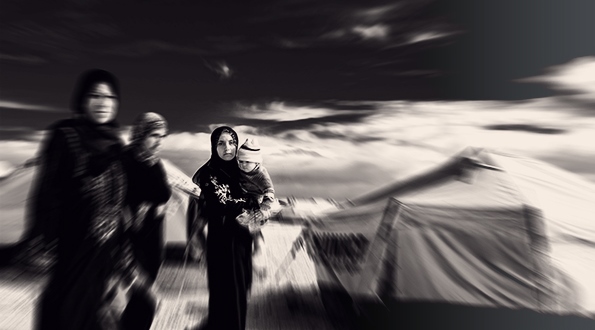BECOME A MEMBER
>JOIN
Survey of Syrian Women: Peace Talks Fail to Engage Women

On January 22, the Geneva II talks started in Montreux. On January 24, the talks moved to Geneva, Syria's opposition and government met briefly face to face, but did not speak directly.
Few days before, Kristin Williams published an article announcing the report on a survey of 110 women living and wokring inside Syria. "But who will be at the table?", Williams asked. The survey was conducted by the Institute for Inclusive Security in partnership with the Center for Civil Society and Democracy in Syria:
[...] The resulting report shows they overwhelmingly support the inclusion of women, and of civil society more generally, in the Geneva II peace talks. These groups, one woman asserted, are “the link between the opinions of Syrian people and the decision makers.”
[The Institute for Inclusive Security] asked respondents their criteria for who should represent Syria at the negotiation table. Among other items, they said civil society representatives must be:
- Inclusive of ethnicity, gender, geography, and other demographics
- Connected to what’s happening inside the country
- Politically independent
- Skilled and qualified
- Experienced in such areas as politics, gender, and civil peace
(For a full list of criteria, see page three of the report.)
Unfortunately, the survey responses indicate the international actors responsible for coordinating the talks are not reaching active women leaders on the ground. Only 37 out of 110 felt informed about the peace process (mostly through the media), and 90% stated that they have not been engaged at all by the relevant international actors. Although the women have undertaken a long list of activities—from mobilization to advocacy to media outreach—in order to assert their voices in the negotiations, they aren’t being heard.
Many barriers stand in their way, the most potent being lack of security in their communities. Still, 77% said that they personally want to participate in discussions related to the peace and transition process, despite the challenges.
Thus far, only one woman is expected to form part of the opposition’s delegation to Geneva. The composition of the government’s delegation has not been announced. In an encouraging step, last week, UN Special Envoy Lakhdar Brahimi met with 50 female Syrian leaders convened by UN Women to hear their recommendations for ensuring Geneva II is inclusive of women and civil society.
The stakes are staggeringly high. Over 2.3 million refugees have fled into Jordan, Iraq, Lebanon, and Turkey, and 6.5 million more are displaced within the country. Besieged communities are living without electricity, water, sometimes food. The lowest estimates say that over 100,000 men, women, and children have been killed.
To end this horrific conflict, all parties to the negotiations must heed the important perspectives expressed by Syrian women. More than that, they must fulfill international commitments to ensure women’s full and meaningful participation in Geneva.
Originally published on the homepage of the Institute for Inclusive Security.
To read the entire report, please click here.
Photo by Omar Alsorory.

